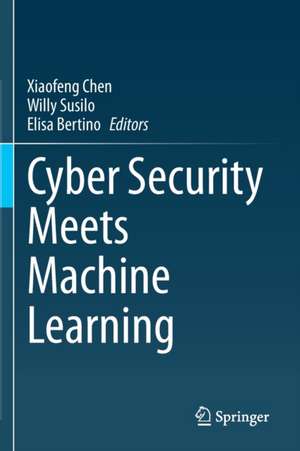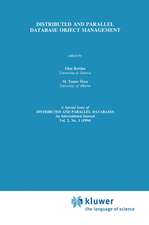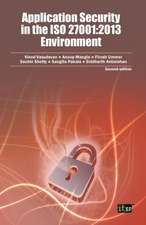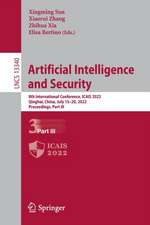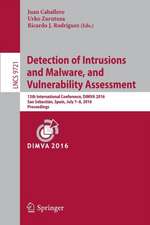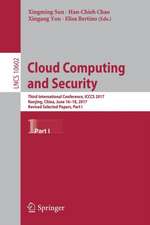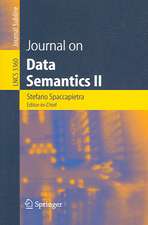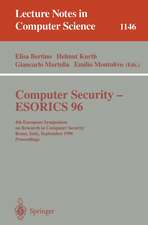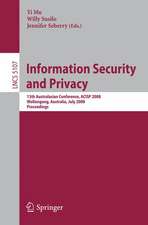Cyber Security Meets Machine Learning
Editat de Xiaofeng Chen, Willy Susilo, Elisa Bertinoen Limba Engleză Paperback – 4 iul 2022
This book reviews the latest research in the area, including effective applications of machine learning methods in cybersecurity solutions and the urgent security risks related to the machine learning models. The book is divided into three parts: Cyber Security Based on Machine Learning; Security in Machine Learning Methods and Systems; and Security and Privacy in Outsourced Machine Learning. Addressing hot topics in cybersecurity and written by leading researchers in the field, the book features self-contained chapters to allow readers to select topics that are relevant to their needs. It is a valuable resource for all those interested in cybersecurity and robust machine learning, including graduate students and academic and industrial researchers, wanting to gain insights into cutting-edge research topics, as well as related tools and inspiring innovations.
| Toate formatele și edițiile | Preț | Express |
|---|---|---|
| Paperback (1) | 639.52 lei 6-8 săpt. | |
| Springer Nature Singapore – 4 iul 2022 | 639.52 lei 6-8 săpt. | |
| Hardback (1) | 930.41 lei 6-8 săpt. | |
| Springer Nature Singapore – 3 iul 2021 | 930.41 lei 6-8 săpt. |
Preț: 639.52 lei
Preț vechi: 799.41 lei
-20% Nou
Puncte Express: 959
Preț estimativ în valută:
122.37€ • 128.11$ • 101.25£
122.37€ • 128.11$ • 101.25£
Carte tipărită la comandă
Livrare economică 05-19 aprilie
Preluare comenzi: 021 569.72.76
Specificații
ISBN-13: 9789813367289
ISBN-10: 9813367288
Pagini: 163
Ilustrații: IX, 163 p. 41 illus., 24 illus. in color.
Dimensiuni: 155 x 235 x 13 mm
Greutate: 0.25 kg
Ediția:1st ed. 2021
Editura: Springer Nature Singapore
Colecția Springer
Locul publicării:Singapore, Singapore
ISBN-10: 9813367288
Pagini: 163
Ilustrații: IX, 163 p. 41 illus., 24 illus. in color.
Dimensiuni: 155 x 235 x 13 mm
Greutate: 0.25 kg
Ediția:1st ed. 2021
Editura: Springer Nature Singapore
Colecția Springer
Locul publicării:Singapore, Singapore
Cuprins
Chapter 1. IoT Attacks and Malware.- Chapter 2. Machine Learning-based Online Source Identification for Image Forensics.- Chapter 3. Reinforcement Learning Based Communication Security for Unmanned Aerial Vehicles.- Chapter 4. Visual Analysis of Adversarial Examples in Machine Learning.- Chapter 5. Adversarial Attacks against Deep Learning-based Speech Recognition Systems.- Chapter 6. Secure Outsourced Machine Learning.- Chapter 7. A Survey on Secure Outsourced Deep Learning.
Notă biografică
Xiaofeng Chen is a professor of the School of Cyber Engineering, Xidian University, China. His research interests include cryptography, cloud computing security, artificial intelligence security. He has published over 180 research papers in refereed international conferences and journals. His work has been cited more than 10000 times according to Google Scholar. He has served as Program/General Chair for various international conferences such as ProvSec 2011, NSS 2014, AsiaCCS 2016, INSCRYPT 2017, ML4CS 2019. He has been the PC member for more than 50 international conferences in networking, and information security. He is in the Editorial Board of IEEE Transactions on Dependable and Secure Computing, Computer Standards & Interfaces (CSI), and Security & Privacy. He is a Senior Member of the IEEE.
Willy Susilo is the Head of the School of Computing and Information Technology at UOW. Before this role, he was the Head of the School of Computer Science and Software Engineering (SCSSE), Deputy Director of ICT Research Institute and the Academic Program Director for UoW (Singapore). He is also the Director of the Centre for Computer and Information Security Research. He has been awarded a prestigious Australian Research Council (ARC) Future Fellowship. His main research interests include cryptography and computer security, in particular the design of signature schemes. Willy has published more than 350 research papers. He has been awarded various competitive research grants, including ARC Discovery Projects, ARC Linkage Projects, Prime Minister and Cabinet, Microsoft Project, and Smart CRC.
Elisa Bertino is a professor of Computer Science at Purdue University. She serves as Director of the Purdue Cyberspace Security Lab (Cyber2Slab). Before joining Purdue, she was a professor and department head at the Department of Computer Science and Communication of the University of Milan. She has been a visiting researcher at the IBM Research Laboratory in San Jose (now Almaden), at the Microelectronics and Computer Technology Corporation, at Rutgers University, at Telcordia Technologies. She has also held visiting professor positions at the Singapore National University and the Singapore Management University. Her main research interests include security, privacy, database systems, distributed systems, and sensor networks. Her recent research focuses on cybersecurity and privacy of cellular networks and IoT systems, and edge analytics for cybersecurity. Elisa Bertino is a Fellow member of IEEE, ACM, and AAAS. She received the 2002 IEEE Computer Society Technical Achievement Award for “For outstanding contributions to database systems and database security and advanced data management systems”, the 2005 IEEE Computer Society Tsutomu Kanai Award for “Pioneering and innovative research contributions to secure distributed systems”, and the 2019-2020 ACM Athena Lecturer Award.
Willy Susilo is the Head of the School of Computing and Information Technology at UOW. Before this role, he was the Head of the School of Computer Science and Software Engineering (SCSSE), Deputy Director of ICT Research Institute and the Academic Program Director for UoW (Singapore). He is also the Director of the Centre for Computer and Information Security Research. He has been awarded a prestigious Australian Research Council (ARC) Future Fellowship. His main research interests include cryptography and computer security, in particular the design of signature schemes. Willy has published more than 350 research papers. He has been awarded various competitive research grants, including ARC Discovery Projects, ARC Linkage Projects, Prime Minister and Cabinet, Microsoft Project, and Smart CRC.
Elisa Bertino is a professor of Computer Science at Purdue University. She serves as Director of the Purdue Cyberspace Security Lab (Cyber2Slab). Before joining Purdue, she was a professor and department head at the Department of Computer Science and Communication of the University of Milan. She has been a visiting researcher at the IBM Research Laboratory in San Jose (now Almaden), at the Microelectronics and Computer Technology Corporation, at Rutgers University, at Telcordia Technologies. She has also held visiting professor positions at the Singapore National University and the Singapore Management University. Her main research interests include security, privacy, database systems, distributed systems, and sensor networks. Her recent research focuses on cybersecurity and privacy of cellular networks and IoT systems, and edge analytics for cybersecurity. Elisa Bertino is a Fellow member of IEEE, ACM, and AAAS. She received the 2002 IEEE Computer Society Technical Achievement Award for “For outstanding contributions to database systems and database security and advanced data management systems”, the 2005 IEEE Computer Society Tsutomu Kanai Award for “Pioneering and innovative research contributions to secure distributed systems”, and the 2019-2020 ACM Athena Lecturer Award.
Textul de pe ultima copertă
Machine learning boosts the capabilities of security solutions in the modern cyber environment. However, there are also security concerns associated with machine learning models and approaches: the vulnerability of machine learning models to adversarial attacks is a fatal flaw in the artificial intelligence technologies, and the privacy of the data used in the training and testing periods is also causing increasing concern among users.
This book reviews the latest research in the area, including effective applications of machine learning methods in cybersecurity solutions and the urgent security risks related to the machine learning models. The book is divided into three parts: Cyber Security Based on Machine Learning; Security in Machine Learning Methods and Systems; and Security and Privacy in Outsourced Machine Learning. Addressing hot topics in cybersecurity and written by leading researchers in the field, the book features self-contained chapters to allow readers to select topics that are relevant to their needs. It is a valuable resource for all those interested in cybersecurity and robust machine learning, including graduate students and academic and industrial researchers, wanting to gain insights into cutting-edge research topics, as well as related tools and inspiring innovations.
This book reviews the latest research in the area, including effective applications of machine learning methods in cybersecurity solutions and the urgent security risks related to the machine learning models. The book is divided into three parts: Cyber Security Based on Machine Learning; Security in Machine Learning Methods and Systems; and Security and Privacy in Outsourced Machine Learning. Addressing hot topics in cybersecurity and written by leading researchers in the field, the book features self-contained chapters to allow readers to select topics that are relevant to their needs. It is a valuable resource for all those interested in cybersecurity and robust machine learning, including graduate students and academic and industrial researchers, wanting to gain insights into cutting-edge research topics, as well as related tools and inspiring innovations.
Caracteristici
Illustrates the advantages of machine learning in solving classic cybersecurity problems Reviews the security concerns and research relating to the current machine learning models and systems Presents the security problem and solutions for outsourced machine learning
